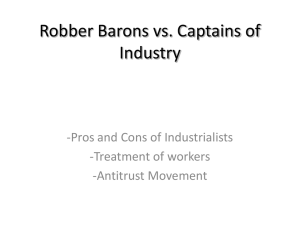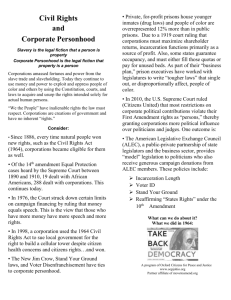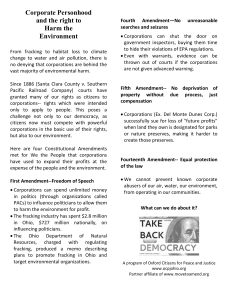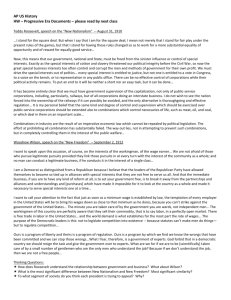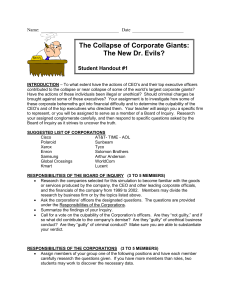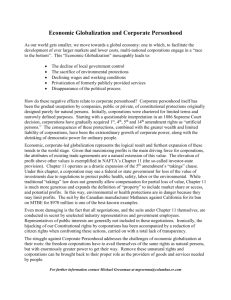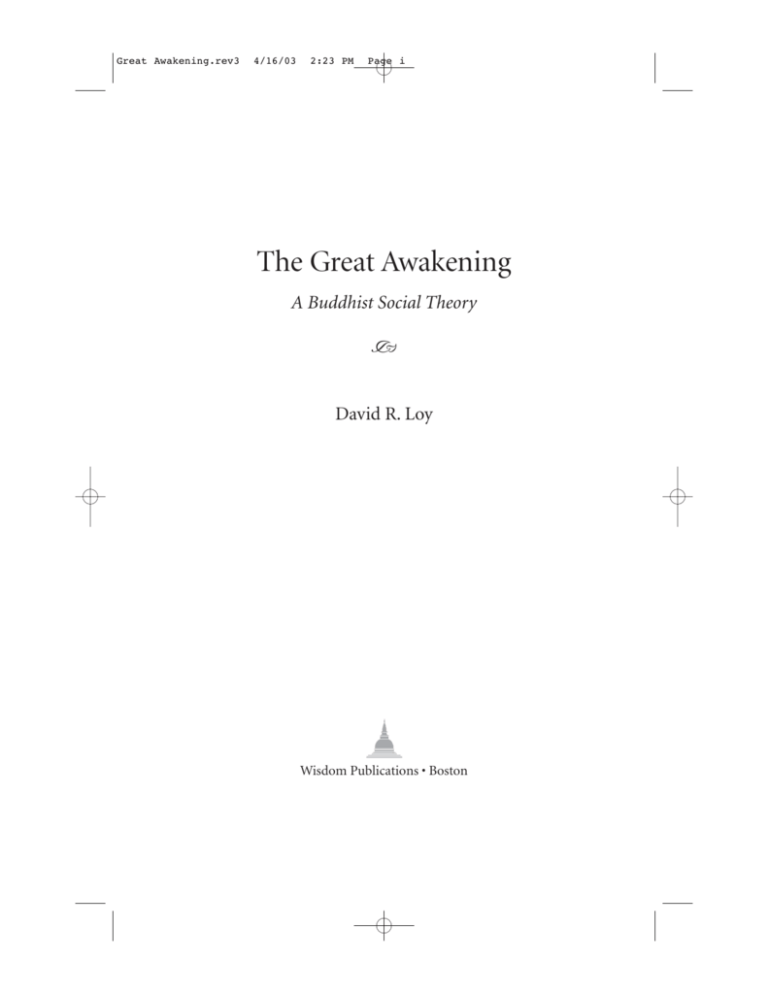
Great Awakening.rev3
4/16/03
2:23 PM
Page i
The Great Awakening
A Buddhist Social Theory
K
David R. Loy
Wisdom Publications • Boston
Great Awakening.rev3
4/16/03
2:23 PM
Page ii
Wisdom Publications
199 Elm Street
Somerville, MA 02144
© David R. Loy 2003
All rights reserved.
No part of this book may be reproduced in any form or by any means, electronic or
mechanical, including photography, recording, or by any information storage and
retrieval system or technologies now known or later developed, without permission
in writing from the publisher.
Library of Congress Cataloging-in-Publication Data
Loy, David R.
The great awakening : a Buddhist social theory / David R. Loy.
p.cm.
ISBN 0-86171-366-4 (pbk. : alk. paper)
1. Sociology, Buddhist. 2. Buddhism—Social aspects. 3. Religious
life—Buddhism. 4. Buddhism and social problems. I. Title.
BQ4570.S6L69 2003
294.3'37—dc21
2003004783
07 06 05 04 03
6 5 4 3 2 1
Wisdom Publications’ books are printed on acid-free paper and meet the guidelines for permanence and durability of the Committee on Production Guidelines
for Book Longevity of the Council on Library Resources.
Printed in United States of America
Great Awakening.rev3
4/16/03
2:23 PM
Page 91
chapter 4
Can Corporations
Become Enlightened?
We have given corporations dominion over the sustaining of our lives.
They have become sovereign citizens and we have become consumers.
They concentrate power and wealth. They design and shape our society and world. They carve our goals and aspirations. They shape our
thoughts and our language. They create the images and metaphors of
our time, which our children use to define their world and their lives.
In other words: what corporations do well, what corporations are
designed to be, is the problem.
—Richard Grossman
D
espite their enormous and increasing impact upon all of us, most of
us know little about corporations. We read about mergers and hostile
takeovers, and what stock price has fallen due to an earnings warning. Periodically we follow the latest CEO scandal, as his (rarely her) once-hyped company collapses into bankruptcy. Yet few of us understand how massive
corporations have come to assume such a dominant role in public life, or why
they function in the ways that they do. Today corporations are the main agent
of globalization and the institutions that have more impact on our daily lives
than any other, with the possible exception of government. By 1995, only 49
of the world’s 100 largest economies were nations; the other 51 were corporations. For example, Malaysia’s economy was number 53, bigger than the Japanese corporation Matsushita (54) but somewhat smaller than IBM (52);
Mitsubishi, the largest corporation in the world until the Japanese economic
bubble burst, was number 22. Total assets of the top 100 multinationals
Great Awakening.rev3
92
4/16/03
2:23 PM
Page 92
t h e g re at awa ke n i n g
increased seven times between 1980 and 1995, while the total number of their
employees decreased. The combined sales of the top 200 multinational corporations were bigger than the combined GDP of 182 countries (all but the
top 9). That is almost 30 percent of world GDP. Yet those corporations
employed less than one-third of 1 percent of the world’s population, a percentage that has been shrinking.47
In the United States six corporations (versus fifty in 1983) now control most
of the media. The largest one hundred corporations buy about three-quarters
of commercial network time and over half of public television time as well.48
This means that they decide what is shown on television and what is not—in
other words, that TV has more or less become their “private medium” for
influencing the rest of us. In short, corporations control the U.S. “nervous
system” and increasingly the international one as well.
Many social commentators have been addressing the economic and political implications of this consolidation. The concern of this short chapter is to
examine the present role of corporations from a Buddhist perspective. One
important aspect, of course, is the question of responsibility. Today, thanks to
spreading ideals of democracy, it is increasingly accepted that states are or
should be responsible to their citizens, but to whom are transnational corporations responsible? There is also another, perhaps even more fundamental
issue that Buddhism can shed some light upon: the “empty” nature of corporations and what their lack of self-being means for our globalizing world,
now being reconstructed to meet the needs of these fictive (i.e., socially constructed) institutions.
Whenever we want to understand something, one of the first places to look
is at its history, which usually illuminates features that we otherwise overlook
or misunderstand. What does their past teach us about corporations and their
responsibilities?
Incorporated business enterprises, with their liabilities legally limited, originated in Europe. According to some sources, the earliest record of such a corporation is from Florence in 1532. Both the date and place are significant.
Columbus had “discovered” America in 1492. Just as important, Vasco da
Gama had sailed around Africa to India in 1498 and returned with cargo
worth sixty times the cost of his voyage. A profit of 6,000 percent! You can
imagine what effect that had on the dreams of Italian merchants. There were
some problems, however. It was extremely expensive to outfit an expedition,
so very few people could afford to do so. Voyages were also extremely risky;
Great Awakening.rev3
4/16/03
2:23 PM
Page 93
c a n c o r p o r at i o n s b e c o m e e n l i g h te n e d ?
93
the chance of a ship sinking in a storm or being taken by pirates was considerable. Finally, there were debtor’s prisons—not only for you but for your family and your descendants—if you lost your ship and could not pay your debts.
The solution to these problems was ingenious: limited liability. Unlike partnerships, where each partner is legally responsible for all business debts, limited liability means you can lose only the amount you invest. Such an
arrangement required a special charter from the state, which in Renaissance
Italy was usually the local prince. This was convenient not only for the
investors but for the prince, because a successful expedition increased the
wealth of his territory, and also because he was in line for a cut of the profits
for granting the charter.
From the beginning, therefore, corporations have been involved in colonialism and colonial exploitation, a process that continues today under a
“neocolonial” economic globalization that continues to transfer wealth from
the South to the North. Although they have plenty of help from the World
Bank and the International Monetary Fund, corporations continue to be the
main institutions that supervise this process.
Corporations have also had an incestuous relationship with the state. In
the sixteenth century, nation-states as we know them did not exist. The
resources generally available to rulers were too limited for them to exercise the
kind of sovereignty that we now take for granted. The self-aggrandizing state
that we know today developed along with the royally chartered corporation,
because they were dependent on each other—Siamese twins, as it were. The
enormous wealth extracted from the New World, in particular, enabled states
to become more powerful and ambitious, so rulers assisted the colonization
and corporatization process by dispatching their armies and navies to “pacify”
foreign lands. As this suggests, there was a third partner, which grew up along
with the other two: the modern military. Together they formed an “unholy
trinity,” thanks to new technologies (gunpowder for aggression, the compass
for navigation) and to this clever new type of business organization that minimized the financial risk. In short, the modern nation-state and its military
machine matured by feeding on colonial exploitation, in the same way that
chartered corporations did.
The United States was born of a revolt against corporations, which had
been used as instruments of abusive power by British kings. The new republic
was deeply suspicious of both government control and corporate power.
Corporations were chartered by the states in order to keep them under close
Great Awakening.rev3
94
4/16/03
2:23 PM
Page 94
t h e g re at awa ke n i n g
local scrutiny, not by the federal government (the U.S. Constitution does not
mention them). The term of corporate charters was limited, and they were
automatically dissolved if not renewed or if corporations engaged in activities not granted by their charters. By 1800 there were only about two hundred corporate charters in the United States.
The next century was a period of great struggle between corporations and
civil society. The turning point was the Civil War. With huge profits from procurement contracts, corporations were able to take advantage of the disorder
and corruption of the times to buy legislatures, judges, and even presidents.
Lincoln complained shortly before his death: “Corporations have been
enthroned. . . . An era of corruption in high places will follow and the money
power will endeavor to prolong its reign by working on the prejudices of the
people . . . until wealth is aggregated in a few hands . . . and the republic is
destroyed.” Rutherford Hayes, who became president in 1876 due to a tainted
election and back-room corporate-dominated elections, later declared: “This
is a government of the people, by the people and for the people no longer. It
is a government of corporations, by corporations, and for corporations.”49
Corporations gradually gained enough influence to rewrite the laws governing their creation: for example state charters could not be revoked, and
corporations could engage in any economic activity without any time limitation, and so forth. Their biggest success was in 1886, when the Supreme
Court ruled in Santa Clara County v. Southern Pacific Railroad that a private
corporation is a “natural person” under the U.S. Constitution and thus entitled to all the protections of the Bill of Rights, including free speech. Given
their vast financial resources available for defending and exploiting these
rights, this means, in effect, that corporations today are more free than any
citizen ever can be.
This incestuous history needs to be emphasized, not only because we are
ignorant of it, but because it continues today. We distinguish between the
government and the economy, yet at their upper levels there is rarely any effective distinction between them. As Dan Hamburg, a former Democratic representative from California, concluded from his years in the U.S. Congress:
“The real government of our country is economic, dominated by large corporations that charter the state to do their bidding. Fostering a secure environment in which corporations and their investors can flourish is the
paramount objective of both [political] parties.”50 The same is true internationally. Almost everywhere, globalization means that the interests of politi-
Great Awakening.rev3
4/16/03
2:23 PM
Page 95
c a n c o r p o r at i o n s b e c o m e e n l i g h te n e d ?
95
cians who control the destinies of nations are increasingly entwined with the
concerns of those who control corporations. In most countries the elite move
back and forth quite easily from one to the other, from CEO to cabinet position and back again. Naturally they identify with each other’s interests. Think,
for example, how much U.S. foreign policy today is determined by the desire
to pry open or keep open foreign markets (and raw materials, cheap labor,
etc.) for U.S. corporate penetration. Occasionally there have been exceptions
to this cozy relationship—genuinely populist leaders like Allende in Chile,
for example—but for some reason they tend not to survive very long.
This brings us back to the question of corporate responsibility. A royal
charter listed a corporation’s privileges and responsibilities. It has been said
that corporate history since then is a story of attempts by corporations to
increase their privileges and to reduce their responsibilities. One important
step in reducing that responsibility was the introduction of the joint stock
company. The first English one was chartered in 1553. One’s shares in a corporation could now be bought and sold freely, even in a foreign country. The
stock market has since become an essential feature of every developed economy, of course, and of many developing ones as well. Consider, however, the
effects of this development on corporate responsibility—on the ethical consequences of business activities. Legally, the primary responsibility of a corporation is neither to its employees nor to its customers but to its stockholders;
after all, it is the stockholders who own the corporation. What does it mean,
then, when those stockholders are anonymous, scattered here and there, and
with no interest in the corporation’s activities except insofar as they affect its
profitability?
Compare the situation of a locally owned business. Suppose you are a master carpenter living in sixteenth-century Italy. When business is good, you
employ several other carpenters and apprentices. If you treat them badly—
long hours, low wages—it might be difficult for you to escape all the consequences. You and your family live above the workshop, or around the corner.
Your wife sees the wives of your senior workers, whether or not she socializes
with them. Your children probably play with their children, may even take
lessons from the same teachers. You worship in the same church, participate
in the same local festivals. In such a situation economic responsibility is
also local and not so easily evaded. Everyone in the town knows how you
treat your workers, and that affects what other people think about you and
how they respond to you.
Great Awakening.rev3
96
4/16/03
2:23 PM
Page 96
t h e g re at awa ke n i n g
Contrast that with what happened at Bhopal, India, in 1984, where it is now
believed that well over ten thousand people died and another fifty thousand
were permanently injured in the world’s worst chemical disaster, when a
Union Carbide plant leaked toxic gases. Although I do not know who they
were, it is safe to assume that the stockholder owners of Union Carbide were
elsewhere, living in various places around the world, and that the large majority of them felt no individual responsibility for what happened (although,
exceptionally, a few were outraged enough to protest). Needless to say, the
people most responsible for managing Union Carbide also lived and worked
far away from Bhopal. Whatever legal liability a corporation may have—usually only financial—is quite different from having to live with the consequences, and this difference has a great impact upon the way that impersonal
institutions like corporations can conduct their business.
It is important to understand that Union Carbide’s problem at Bhopal was
not primarily a technological one, (and it is important not to think that such
debacles are are one of the “unavoidable dangers” of modern life), but a matter of corporate irresponsibility—or rather, as I prefer to put it, of corporate
immorality. The gas that escaped is so volatile and dangerous that normally
it is not stored but immediately made into a more stable compound. At the
Bhopal plant it was stored improperly, without being refrigerated. The emergency release valve was not working. There had been prior problems and accidents, yet recommendations resulting from those incidents had not been
implemented. There were no plans or exercises for emergency evacuation; no
information or training had been provided to the municipality about the gas
or how to respond to such an accident.
Consider this simple change to the scenario: If the CEO of Union Carbide
had been living next door to that plant, with his family, would those dangerous conditions have been permitted to continue?
Moreover, the Union Carbide corporation never apologized for the accident, evidently because of the legal implications of such an apology. Instead,
company executives in India spread rumors that a disgruntled employee had
caused the disaster, although no evidence to support this was ever provided.
This inability to apologize is precisely my point: it is intrinsic to the nature of
impersonal corporations, with limited liability, that they cannot be responsible in the way that you and I can be. Dr. Rosalie Bertell, who directed the
International Medical Commission to Bhopal in January 1994, was asked how
the Bhopal disaster has changed the way multinationals operate abroad. Her
Great Awakening.rev3
4/16/03
2:23 PM
Page 97
c a n c o r p o r at i o n s b e c o m e e n l i g h te n e d ?
97
reply is sobering: “I don’t think it has, and that’s scary. I think that most of
them think that Union Carbide got away with it, and maybe they could get
away with it. I think the effect has been minimal.” In the end the accident cost
Union Carbide nothing. Union Carbide settled all claims for $470,000,000,
which was covered by its insurance.51
We begin to understand how “a principle purpose of corporations is to
shield the managers and directors who run them, and shareholders who
profit, from responsibility for what the corporation actually does.”52 This also
explains why we should speak of transnational corporations rather than
multinational ones. Early corporations transcended local communities; today
the largest, most powerful corporations transcend responsibility even to
nation-states and their citizens. In their preoccupation with profitability, they
have learned to play off communities and nations against each other in order
to obtain the most favorable operating conditions—the biggest tax breaks,
the least environmental regulation, and so forth. This has been a significant
development: although corporations and nation-states grew up together, in
important respects they have separated. Today corporations are freer than
nation-states, which remain bound (at least in principle) by their responsibilities to their own borders and peoples. Corporations have no such fixed
obligations. They can reinvent themselves completely, in a different location
and even in a different business, when it is convenient for them to do so.
Emptiness, Inc.
So what makes a corporation a corporation? To become “incorporated” (from
the Latin corpus, corporis, “body”) does not mean, of course, that a corporation gains a physical body. You cannot point to a corporation, because its
“being” is not material. It is created by a government charter, issued in
response to filing an official document and paying a (usually nominal) fee. In
principle, at least, such bodiless corporations are now immortal. You can
point to a building that is owned or used by a corporation, yet that building
can be sold without affecting the legal status of that corporation. In fact,
everything can be replaced—all the people working for it, all the material
resources owned by it, the activities it engages in, even its name—while it
remains essentially the same corporation.
Viewed from another angle, corporations are not things but processes.
Despite not having physical bodies, corporations are dissipative systems. That
is, a corporation takes in energy from the outside (e.g., raw materials), which
Great Awakening.rev3
98
4/16/03
2:23 PM
Page 98
t h e g re at awa ke n i n g
it processes in various ways (manufacturing). In order to continue “living”
indefinitely, its income must not be less than its expenditures. In addition,
and as with organic beings, this process is subject to the law of entropy:
although value-added products may be produced (manufactured goods),
energy is consumed in the process.
There is an important parallel here with human beings. Of course, our physical bodies are also dissipative systems that absorb energy and use it for physical and mental activities. From a Buddhist perspective, however, the parallel
is deeper, for like corporations humans are constructions, according to the
Buddhist doctrine of anatta. Buddhism teaches that our sense of self is a delusion because the feeling that there is a “me” apart from the world is mistaken.
This similarity between corporations and people—both being dissipative
yet integrated constructs—raises the question as to whether corporations are
subject to the same type of problems. According to the second noble truth of
the Buddha, the primary cause of human dissatisfaction is tanha, or craving;
sometimes ignorance is emphasized as well. Is this also the problem with corporations? It seems to be a natural tendency of our minds never to be satisfied
with what we have, but always to want more. The tendency of corporations to
expand and seek ever greater profits implies a similar problem. When we consider the Buddhist solution to this problem, however, we realize the difference
between corporations and us.
The difference is that corporations are legal fictions, social constructs, and
that is why they are so dangerous: without a body, they are essentially
ungrounded to the earth and its creatures, to the pleasures and responsibilities that derive from being manifestations of the earth’s biosphere. You may
prefer to say that corporations are unable to be spiritual, because they lack a
soul, but I think it amounts to the same thing. As the example of Bhopal
shows, a corporation is unable to feel sorry for what it has done (it may occasionally apologize, but that is public relations, not sorrow). A corporation
cannot laugh or cry; it cannot enjoy the world or suffer with it.
Most important of all, a corporation cannot love. Love implies realizing
our interconnectedness with others and living in a way that embodies our
concern for their well-being. Love is not an emotion but a genuine engagement with others that includes responsibility for them, a responsibility that
transcends our own individual self-interest. If that sense of responsibility is
not there, one’s love is not real. Corporations cannot experience such love or
live according to it, not only because they are immaterial, but because their
Great Awakening.rev3
4/16/03
2:23 PM
Page 99
c a n c o r p o r at i o n s b e c o m e e n l i g h te n e d ?
99
primary responsibility is to create wealth for the shareholders who own them.
A CEO who tries to subordinate his company’s profitability to his love for the
world will lose his position, for he is not fulfilling his financial responsibility
to its shareholders.
To make the same point in more Buddhist terms: despite the talk we occasionally hear about “enlightened” corporations, a corporation cannot actually
become enlightened in the Buddhist sense of the word. Buddhist enlightenment includes realizing that my sense of being a self apart from the world is
a delusion that causes suffering for the world and for me. To realize that I am
the world—that I am one of the many ways the world manifests—is the cognitive side of the love that an enlightened person feels for the world and its
creatures. The realization and the love are two sides of the same coin, which
is why Buddhism emphasizes that genuine enlightenment is accompanied by
a spontaneous welling-up of compassion for all other sentient beings. Legal
fictions such as corporations cannot experience this any more than robots or
computers can.
What most concerns me about corporations, and about a globalization
realized primarily by and for them, is that corporations are “fueled” by, and
reinforce, not wisdom or compassion but a very different human trait:
namely, greed. As we saw in the previous chapter, our corporate-dominated
economy requires greed in at least two ways: a desire for ever more profit is the
engine of the economic process; and in order for the economy to keep
expanding, consumers must be conditioned into always wanting more.
Buddhism, like most religious traditions, acknowledges the power of greed,
yet rather than erect an economic system based upon it, Buddhism emphasizes the need to control it.
Corporations, however, rationalize and “naturalize” our constant desire for
more than we already have. The problem with greed magnifies when it is institutionalized in an impersonal corporation that functions quite independently
of the values of the people employed by it. For corporations, the world (which,
again, is our mother as much as our home) can be meaningful only as a source
of raw materials or as a market for its products—in other words, as commodified. The result is that a modern corporation tends to function as a
socially constructed vehicle of institutionalized greed.
The stock market is a good example. With few exceptions, it tends to
function as an ethical “black hole” that dilutes and renders anonymous the
responsibility for the actual consequences of the collective greed that now
Great Awakening.rev3
100
4/16/03
2:23 PM
Page 100
t h e g re at awa ke n i n g
fuels economic growth. At the one end of that hole, investors want increasing
returns in the form of dividends and higher stock prices. At the other end, this
anonymous expectation translates into a generalized, impersonal pressure for
profitability and growth, preferably in the short run. However well intended
they may otherwise be, CEOs unable to meet this demand will not last long.
The globalization of market capitalism means that such profitability and
growth are becoming increasingly important as the engine of world economic
activity. Everything else, including the environment, employment, and the
quality of life, tends to become subordinated to this anonymous demand thatis-never-satisfied.
Who is responsible for this pressure for growth? The system has attained
a life of its own. We all participate in this process, as workers, employers,
consumers, and investors, yet with little or no personal sense of moral
responsibility for what happens, because such responsibility has been diffused so completely that it is lost in the impersonality of the corporate economic system.
In an important sense, that total loss of responsibility sums up the tragedy
of economic globalization today. Increasingly, the destiny of the earth is in the
hands of impersonal corporations that, because of the way they are structured, are unmoved by concern for the well-being of the earth’s inhabitants
and are driven by desire for their own profit and growth. This, of course, is
hardly a new insight. Henry Demarest Lloyd expressed it well in 1894: “We
are calling upon [those who wield corporate] power and property, as mankind
called upon kings of their day, to be good and kind, wise and sweet, and we
are calling in vain. We are asking them not to be what we have made them to
be.” It is intrinsic to the nature of corporations that they cannot be responsible in the ways that we need them to be. The impersonal way they are structured guarantees that such responsibility is so diluted and diffused that,
ultimately, it tends to disappear.
One might argue, in reply, that there are good corporations that take good
care of their employees, are concerned about their products and their effect
on the environment, and so forth. The same argument can be made for slavery: there were some good slave owners who took good care of their slaves,
and so on. This does not refute the fact that the institution of slavery is
intolerable. “It is intolerable that the most important issues about human
livelihood will be decided solely on the basis of profit for transnational corporations.”53 And it is just as intolerable that today the earth’s limited
Great Awakening.rev3
4/16/03
2:23 PM
Page 101
c a n c o r p o r at i o n s b e c o m e e n l i g h te n e d ?
101
resources are being allocated primarily according to what is profitable for
transnational corporations.
My Buddhist conclusion is that transnational corporations are defective
economic institutions due to the basic way they are structured. We cannot
solve the problems they keep creating by addressing the conduct of this or
that particular corporation, because the institution itself is the problem. It is
difficult to see how, given their present structure, they can be simply patched
up to make them better vehicles for our economic needs. We need to consider whether it is possible to reform them in some fundamental way—perhaps by rewriting corporate charters, their social umbilical cords—or whether
they should be replaced by other economic and political institutions, ones
that are more responsible to the communities they function in and are motivated by service to the earth and the beings who dwell on it. For example,
corporate charters could contain a clause emphasizing that their concern for
profit will not take precedence over the social and environmental effects of
their activities. This prescription could be subject to yearly review by a board
composed of public citizens as well as state officials. The general concern is to
find ways to legally codify, as well as to emphasize in the public consciousness,
that corporations are allowed to exist only insofar as they promote the common good.
The alternative is to promote the public good with smaller, more localized
economic institutions that are more easily regulated. As long as corporations
in their present form are allowed to remain the primary instruments of economic globalization, they will endanger the future of our children and the
world they will live in.
A final caveat: This Buddhist critique does not imply that large corporations are the economic problem. The ecological and social devastation
wrought by the economic policies of the Soviet Union and Mao’s China
remind us forcefully that corporations have no monopoly on greed. The collapse of communism has augmented the global reach and influence of corporations, but we should have no delusions that curtailing them will be
enough to solve our economic problems. Human greed can take many forms.



